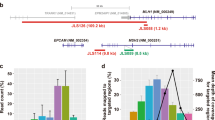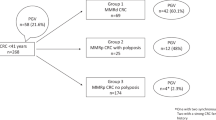Abstract
Hereditary nonpolyposis colorectal cancer (HNPCC) is caused by a deficiency in DNA mismatch repair in consequence of germline mutations mainly in the genes MSH2 and MLH1. Around 10% of patients suspected of HNPCC are identified with large genomic deletions that cannot be detected by conventional methods of mutation screening. The recently developed multiplex ligation-dependent probe amplification (MLPA) proved to be an easy to perform method for deletion detection and is reliable when more than one exon is deleted. We show that, in some cases, apparent deletions of single exons may actually result from single base substitutions or small insertions/deletions in the hybridisation sequence of MLPA probes. We conclude that single exon deletions, detected by MLPA or multiplex PCR, should be validated with additional methods.
Similar content being viewed by others
Log in or create a free account to read this content
Gain free access to this article, as well as selected content from this journal and more on nature.com
or
References
Vasen HF, Watson P, Mecklin JP, Lynch HT : New clinical criteria for hereditary nonpolyposis colorectal cancer (HNPCC, Lynch syndrome) proposed by the International Collaborative group on HNPCC. Gastroenterology 1999; 116: 1453–1456.
Lynch HT, de la Chapelle A : Hereditary colorectal cancer. N Engl J Med 2003; 348: 919–932.
Wijnen J, van der Klift H, Vasen H et al: MSH2 genomic deletions are a frequent cause of HNPCC. Nat Genet 1998; 20: 326–328.
Schouten JP, McElgunn CJ, Waaijer R, Zwijnenburg D, Diepvens F, Pals G : Relative quantification of 40 nucleic acid sequences by multiplex ligation-dependent probe amplification. Nucleic Acids Res 2002; 30: e57.
Wang Y, Friedl W, Sengteller M et al: A modified multiplex PCR assay for detection of large deletions in MSH2 and MLH1. Hum Mutat 2002; 19: 279–286.
Charbonnier F, Raux G, Wang Q et al: Detection of exon deletions and duplications of the mismatch repair genes in hereditary nonpolyposis colorectal cancer families using multiplex polymerase chain reaction of short fluorescent fragments. Cancer Res 2000; 60: 2760–2763.
Charbonnier F, Olschwang S, Wang Q et al: MSH2 in contrast to MLH1 and MSH6 is frequently inactivated by exonic and promoter rearrangements in hereditary nonpolyposis colorectal cancer. Cancer Res 2002; 62: 848–853.
Wang Y, Friedl W, Lamberti C et al: Hereditary nonpolyposis colorectal cancer: frequent occurrence of large genomic deletions in MSH2 and MLH1 genes. Int J Cancer 2003; 103: 636–641.
Gille JJ, Hogervorst FB, Pals G et al: Genomic deletions of MSH2 and MLH1 in colorectal cancer families detected by a novel mutation detection approach. Br J Cancer 2002; 87: 892–897.
Taylor CF, Charlton RS, Burn J, Sheridan E, Taylor GR : Genomic deletions in MSH2 or MLH1 are a frequent cause of hereditary non-polyposis colorectal cancer: identification of novel and recurrent deletions by MLPA. Hum Mutat 2003; 22: 428–433.
Mangold E, Pagenstecher C, Friedl W et al: Spectrum and frequencies of mutations in MSH2 and MLH1 identified in 1721 German families suspected of hereditary nonpolyposis colorectal cancer. Int J Cancer 2005, (in press).
Acknowledgements
We thank the patients who have participated in this study. The work of the German HNPCC Consortium is supported by a multicentre grant from the Deutsche Krebshilfe, Bonn, Germany, Project No.: 70-3027-Ma1.
Author information
Authors and Affiliations
Corresponding author
Rights and permissions
About this article
Cite this article
Wehner, M., Mangold, E., Sengteller, M. et al. Hereditary nonpolyposis colorectal cancer: pitfalls in deletion screening in MSH2 and MLH1 genes. Eur J Hum Genet 13, 983–986 (2005). https://doi.org/10.1038/sj.ejhg.5201421
Received:
Revised:
Accepted:
Published:
Issue date:
DOI: https://doi.org/10.1038/sj.ejhg.5201421
Keywords
This article is cited by
-
A simple way to evaluate self-designed probes for tumor specific Multiplex Ligation-dependent Probe Amplification (MLPA)
BMC Research Notes (2010)
-
Identification and characterization of a novel MLH1 genomic rearrangement as the cause of HNPCC in a Tunisian family: evidence for a homologous Alu-mediated recombination
Familial Cancer (2009)
-
Aberrant splicing in MLH1 and MSH2 due to exonic and intronic variants
Human Genetics (2006)



